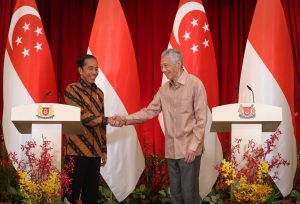President Joko “Jokowi” Widodo’s visit to Singapore last month came at a pivotal moment for Indonesia-Singapore relations. Indonesia’s prior ratification of three agreements with Singapore on the issues of air space management, defense cooperation, and the extradition of fugitives under the 2022 Expanded Framework removed bilateral aggravations in Indonesia-Singapore relations and paved the way for a deepening of their engagement in strategic areas of benefit to both countries.
This deepening of engagement was stamped on March 16, when Jokowi and Singaporean Prime Minister Lee Hsien Loong signed six wide-ranging Memorandums of Understanding (MoUs) and nine business-to-business agreements. The fruitful meeting illustrated how two countries of vastly different sizes can boost political trust and cooperate constructively for mutual benefit.
To take one example, the Jokowi-Lee meeting laid the foundation for a shared future shaped by cultural technopreneurship and digital technology, including artificial intelligence. One such MoU was the Tech: X program, which represents the future of Indonesia-Singapore relations by making young people the focal point for both countries’ joint efforts to nurture tech talent.
This closed-door meeting enabled the two leaders to address complicated issues in a candid manner away from the public spotlight. During their respective terms in office, Jokowi and Lee have shown an ability to overcome domestic impediments such as Indonesian nationalism and political polarization. The meeting thus reflected a “maturing pragmatism” in Indonesia-Singapore relations that looks beyond the domestic by emphasizing areas of mutual interest.
The budding bromance between Jokowi and Lee has been instrumental in achieving a symbiotic and even-keeled relationship, underscoring the essential role that individuals play in effective bilateral diplomacy. This has helped to moderate Indonesia’s “big brother” mind set toward Singapore, and its perception of the latter as a “little red dot,” an equality that will be vital to securing a sustainable future for Indonesia-Singapore relations.
With Indonesia aiming to replace Jakarta with its new national capital Nusantara in 2024, the Jokowi administration has identified Singapore as a leading source of investment in the gargantuan project. This is unsurprising, given that Singapore has been the top foreign investor in Indonesia since 2014 and Jokowi stated during the joint press conference with Lee that there were at least 20 letters of intent from Singaporean companies to invest in Nusantara. Given the importance of foreign investment to the success of the Nusantara project, Singapore’s investor role will be pivotal in the sustainability of Nusantara as the new capital city. Shifting its focus to Nusantara is aligned with Singapore’s strategic goal of investing “beyond” Jakarta.
Galvanized by the Indonesian archipelagic vision of effective geopolitics known as Wawasan Nusantara, “Nusantara diplomacy” is now a cornerstone in Indonesia’s foreign policy. Leveraging the new capital city project, Nusantara diplomacy is aimed at enhancing Indonesia’s self-image in its external relations while also enlivening the nationalistic spirit of its domestic population. It is through the prism of Nusantara diplomacy that Indonesia is bilaterally engaging other countries in Southeast Asia, allowing Singapore riding on the Nusantara wave to further amplify its economic benefits in terms of trade and investment.
The practice of Nusantara diplomacy in Indonesia’s foreign policy is integral in taking Indonesia-Singapore relations to the next level of bilateral engagement, essential for Indonesia to play the role of an active regional multilateralist through ASEAN amid the wider Indo-Pacific, and central to Indonesia cementing its position as a secular middle power with Islamic characteristics.
That Indonesia continues to be viewed as a moderate, pluralistic, and civilizational force resonates with Singapore, as it augurs well for regional peace and stability. The emphasis on civilizational dialogue and cultural diversity, especially at the people-to-people level, provides a further solid underpinning to Indonesia-Singapore relations, not least by serving as a countermeasure against extremism, violence, and radicalization.
For Indonesia to play a pacesetting diplomatic role as chairman of the Association of Southeast Asian Nations (ASEAN) this year, it has to provide imaginative and consultative leadership to deal with regional challenges, such as the Myanmar issue, and garner the support of ASEAN member-states, including Singapore. Given that Indonesia and Singapore are mostly on the same page in their vocal criticism of Myanmar junta not abiding by the bloc’s Five-Point Consensus peace plan, Indonesia will be counting on Singapore to support its efforts as a multilateral mediator and honest broker to resolve the crisis in Myanmar. The more robust Indonesia-Singapore relations are, the stronger and more cohesive ASEAN will be as a regional organization, given the importance of the bilateral relationship to the region as a whole.
Going forward, the litmus test is whether the host of MoUs signed by Jokowi and Lee this month deliver on their stated outcomes. The biggest challenge is to prevent these areas of cooperation from being hijacked by domestic politics, particularly in Indonesia, where Singapore has often been used as a punching bag by opportunistic Indonesian politicians. Potential tensions over issues such as transboundary haze remain of course. But in the current atmosphere of positivity, and with the existing framework for consultation and cooperation, contentious issues can be resolved amicably.
Leaving office with Indonesia-Singapore relations at a zenith will strengthen Jokowi’s legacy as an elder statesman of his era, something that will only be underlined should Jokowi resolve the Myanmar crisis on his watch. As Indonesia moves into a new political era, Jokowi will no doubt be remembered as a good and reliable friend of Singapore.
Despite the twists and turns that mark any bilateral relationship, the good news is that we are seeing the maturing of the partnership between Singapore and Indonesia. This steady upward trajectory is expected to continue despite the coming changes in government, as the next generation of leaders in both countries seems to recognize the mutual advantages of hewing to a cooperative path.

































